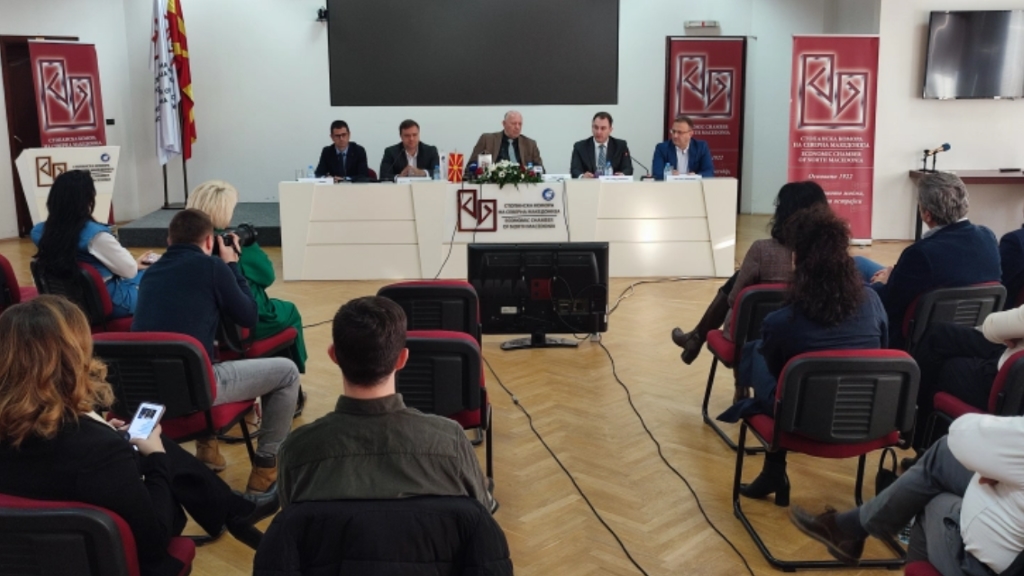On the occasion of the 9th of December, the world day for the fight against corruption, the Chamber of Commerce of North Macedonia and Transparency International – Macedonia organized an event on the theme “Partnership between the business sector, institutions, and civil society organizations in the fight against corruption”.
Corruption is a two-way process, and institutions and the business sector can be involved in it. This is why both stakeholders should be actively engaged in the fight against corruption, which is the conclusion of today’s event.
It was emphasized that digitalization is a good way to fight corruption and that it should be a key tool to fight against this evil that hinders the development of the country along with coordination between institutions.
As the president of the Chamber of Commerce, Branko Azeski pointed out, the fight against corruption is the top priority of the chamber, and business wants to fight against corruption because it is one of its victims.
– We intend to intensify the fight against corruption and will cooperate with the institutions at all levels.
Persistence is the only medicine in the fight against corruption and the truth should always be presented. The fight against corruption should grow from a declarative one to a concrete one.
I expect that in December 2025, when we celebrate December 9 – the Day of the fight against corruption, we will talk about specific activities that we have implemented, said Azeski.
The president of Transparency International – Macedonia, Blagoja Pandovski pointed out that the business sector, the economic growth of the state, and corruption represent a triangle that has many connections and is directly related to the economic development of a country.
– Corruption, on the one hand, destroys business activity and makes it impossible for certain economic entities to reach certain positions in the state and to exercise certain business rights due to some other actors who may be from other spheres who with certain corrupt actions hinder honest businessmen to exercise their right to business activity.
All this has a very negative effect on both the domestic business sphere and foreign investments, said Pandovski and added that non-governmental organizations also have a big role in the fight against corruption because the involvement of the public always causes a public debate, which is one of the main ways of acting in a democratic society.
He emphasized that ethical codes for the business sector, principles for integrity and transparency, and digital tools for reporting corruption, are being prepared…
– “Whistleblowers should be protected in enterprises because they can often prevent corruption in its infancy,” said Pandovski, who pointed out that Transparency International actively participates in drafting the law on whistleblower protection.
The Minister of Digital Transformation, Stefan Andonovski, said that when all processes are automated and digitized, the chances of manipulation and abuse are significantly reduced, leading to a more responsible and transparent society.
– Our path to digital transformation is clear, and we are not giving up on it. As a Ministry, we remain committed to creating more efficient and accountable institutions.
Without delay, we must continue to work in the direction of respect for the principles of the rule of law, transparency, and the fight against corruption,” Andonovski emphasized.
He explained that digital transformation has an effect in two important areas: prevention and communication within the institutions.
– Through the Smart MK initiative, more than 80 new electronic services have been added to the national portal so far, with an impressive growth of 152% in their use by citizens.
We have the potential to create a new culture of digital transparency together, a culture that will not only reduce the space for corruption but also increase trust in institutions.
To achieve these goals, we must continue to invest in digital infrastructure and educate citizens, emphasized Andonovski.
He emphasized that digital management of processes guarantees transparency through electronic signatures and documents with greater accuracy and faster access to services.
The member of the State Commission for the Prevention of Corruption (SCPC), Servet Demiri, said that the private sector plays a key role in building a climate resistant to corruption, and it is of great importance, as he mentioned, that companies protect whistleblowers.
– Companies are the engine of any economy, and corruption within their ranks can distort competition, reduce consumer confidence, and undermine market transparency.
Therefore, it is particularly important for companies to follow the new trends adopted by developed countries by developing clear guidelines for behavior for internal control personnel, providing a reliable system for the protection of those who report corruption, and ensuring continuous cooperation with competent institutions in this district, as well as with civil society organizations that work in the field of corruption prevention, Demiri said.
Sasho Jakovchevski from the State Audit Office pointed out that digitization is a good way to fight corruption; therefore, as he said, everyone should be given equal access to it.
– Digitization has great potential to be one of the key instruments in combating corruption and preventing corrupt activities.
As many as 140 laws are still not aligned with the digitization laws, which is one of the main areas where progress must be made if we want to have successful and complete digitization and realize the potential of digitalization of services, Jakovchevski said.




